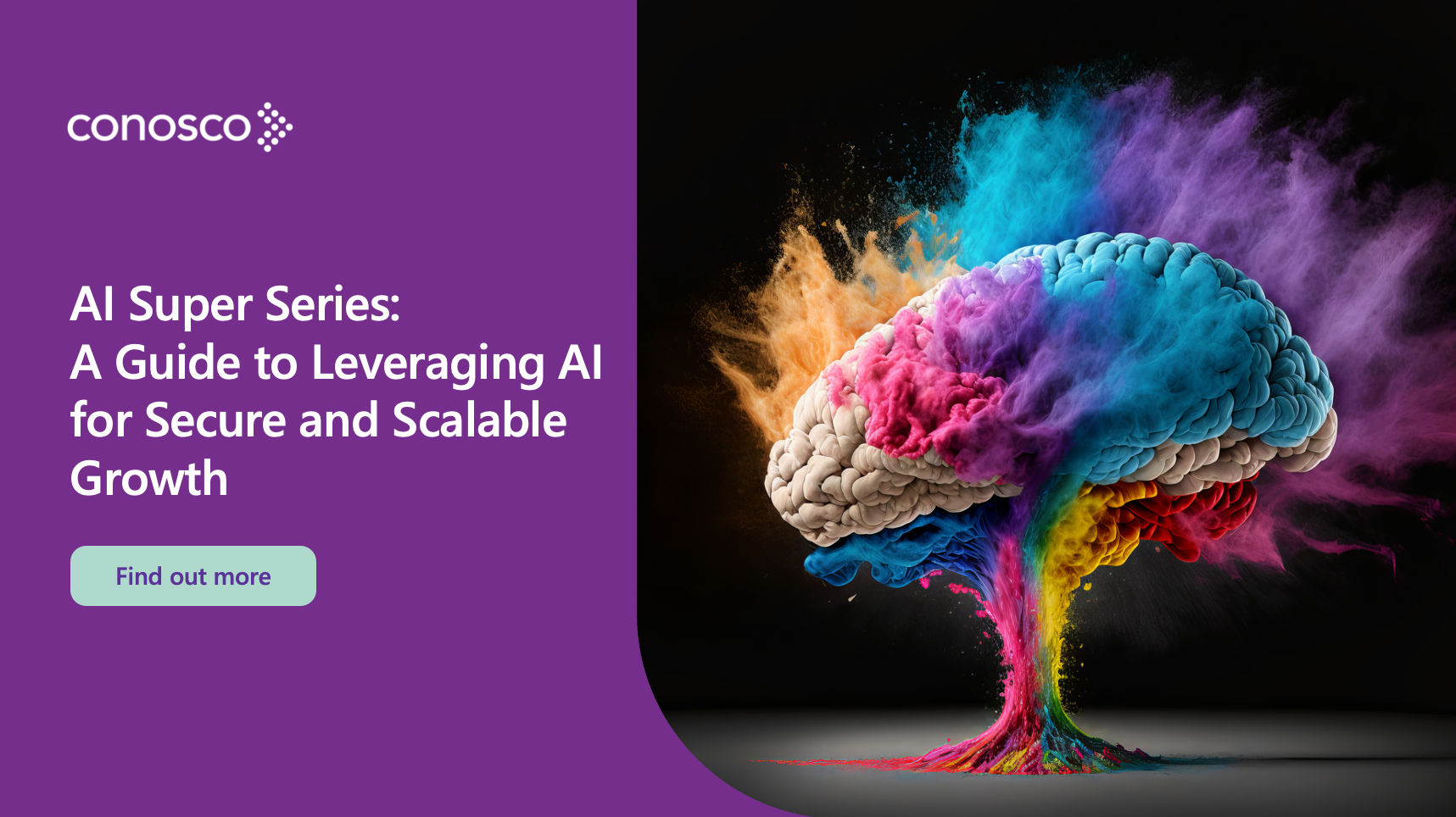Achieving effective AI governance: a practical guide for small and medium businesses
by Jason Holloway on Nov 5, 2024

As small and medium businesses (SMBs) begin to incorporate artificial intelligence (AI) into their operations, AI governance emerges as a crucial element for managing and mitigating risks, ensuring transparency, and maintaining compliance.
For SMBs with limited resources, effective AI governance is not only achievable but essential for growth and resilience. Here’s a look at key governance strategies and how smaller companies can adapt them to fit.
1. Setting ethical guidelines and policies
For smaller companies, creating AI policies need not be as complex as those in large corporations but must still prioritise ethics, transparency, and accountability. While global tech giants like Microsoft and Google have established comprehensive AI principles, SMBs can start by defining core ethical values aligned with their brand and operational goals.
For instance, a marketing firm using AI-driven customer analytics can develop simple policies to ensure data privacy, stating clearly that no data is shared without explicit customer consent. This initial set of ethical guidelines acts as the business’s AI moral compass and can evolve over time.
2. Assigning roles and responsibilities
Unlike larger enterprises with AI ethics officers or committees, SMBs can implement governance by assigning clear roles within their existing structure. For example, appointing a data manager or IT lead to oversee AI ethics and compliance helps keep accountability in-house.
Small businesses may not need dedicated AI teams, but defining responsibilities, like ensuring AI aligns with regulatory standards or periodically reviewing AI outcomes, can help maintain governance standards effectively. Designating one person or team responsible for all AI initiatives also provides a single point of contact for any AI-related inquiries or updates.
3. Conducting bias and fairness checks
Bias in AI models can lead to unfair outcomes, even in small-scale applications. SMBs can tackle this by conducting bias reviews on their AI outputs, especially if their AI systems interact directly with customers or impact business-critical decisions. Open-source tools like IBM’s AI Fairness 360 toolkit are accessible and offer bias detection capabilities, enabling SMBs to check for fairness without incurring high costs.
For example, a small HR firm using AI for resume screening can use this tool to ensure their algorithm isn’t unintentionally favouring certain demographics, thereby protecting the company’s integrity and improving hiring fairness.
4. Implementing data privacy and security standards
For SMBs handling personal data, AI governance should focus heavily on data privacy. Basic practices include encrypting sensitive information, limiting data access, and anonymising data where possible. Tools like Salesforce’s privacy protection protocols serve as an excellent example but can be simplified for smaller operations.
Consider an e-commerce company using AI-driven analytics to personalise customer experiences. By anonymising the data used, they protect customer identities, reducing the risk of data leaks or misuse. Compliance with UK regulations such as GDPR is critical, and simple protocols can make a big difference in maintaining both legal and ethical standards.

Unlock your guide to leveraging AI
Ready to explore the potential of AI in powering your business’s growth, security, and agility? With our exclusive AI Super Series ebook, learn how to strategically implement AI for sustainable success.
5. Monitoring compliance and performance
Continuous monitoring is key to effective AI governance. Smaller companies might not have the capacity for extensive monitoring infrastructure, but regular checks on AI performance can prevent potential pitfalls. Working with a managed services provider can also help set you up for success, especially if they act as an extension of your team. Regular syncs with them helps you set aside time for monthly and quarterly reviews of AI systems, which helps smaller firms identify any misalignment with goals or unexpected risks.
A marketing company, for instance, can review its AI-driven customer segmentation tool quarterly to ensure it continues to function correctly and does not introduce unforeseen bias. Simple tools or a spreadsheet log can track compliance and provide transparency into AI’s ongoing impact on the business.
6. Managing shadow AI
Shadow AI—AI tools implemented outside formal oversight—can be a concern, even for smaller organisations. SMBs should establish basic policies requiring employees to register any new AI application with the IT team or designated data manager. Using network monitoring tools, or working with a managed service provider as a budget-friendly version, can help detect unapproved AI applications.
For example, a small logistics firm could use network monitoring to ensure any AI tools used by staff align with company policies and don’t expose sensitive data. Regular audits can identify any “shadow” applications, protecting the business from potential compliance issues. If this is something that might be of concern, discuss with it with your managed service and security provider for more insight.
7. Setting ethical guidelines and policies
Cultivating a culture of AI literacy empowers employees to use AI responsibly. SMBs can organise periodic workshops or online training sessions to familiarise employees with the basics of AI ethics and responsible usage. AI literacy training doesn't need to be complex—simple, accessible courses focused on data privacy, ethical use, and potential biases can be hugely beneficial.
For instance, a small accounting firm might include an AI awareness session during monthly team meetings, ensuring employees understand the basics of AI ethics and data handling. This ongoing education keeps the workforce aligned with AI best practices and fosters a culture of accountability.
What does good AI governance look like for SMBs?
Effective AI governance in small businesses is characterised by simplicity, flexibility, and ethical alignment. A practical approach includes clear policies, basic compliance checks, and regular monitoring, creating an ethical foundation for AI innovation. By implementing these manageable steps, SMBs can harness AI’s power while minimising risk and maintaining stakeholder trust. One of the critical pieces of the puzzle is having a single person or team responsible for the policies and the guardrails, giving the rest of the business a single point of contact.
Adopting these practices helps smaller businesses stay competitive, positioning them to scale their AI operations with confidence. Ultimately, successful governance in AI for SMBs combines a commitment to ethical practices with strategic oversight, ensuring AI becomes a growth asset rather than a risk factor.
Incorporate AI into your growth strategy
We are ideally positioned to help small and medium-sized businesses integrate AI seamlessly into their growth strategies through robust governance and tailored policies. We understand that for SMEs, AI adoption needs to be both practical and aligned with business goals. Our team supports clients in building AI frameworks that prioritise ethical practices, ensure compliance, and minimise risks, all while identifying areas where AI can enhance efficiency and drive growth. From developing straightforward data privacy guidelines to implementing regular monitoring protocols, our expertise empowers businesses to leverage AI responsibly and effectively, making it a valuable asset in their journey toward innovation and sustainability.
You might be interested in our portfolio of solutions
You May Also Like
These Related Stories

Our New Global Clients: Crabtree & Evelyn and ActionAid
Conosco to deliver strategic Managed IT services to new international clients We are delighted to announce the signing o …

Cyber Security to Protect Companies
Why does your business need a guide to cybersecurity for employees? In homes and businesses around the globe, ransomware …

Conosco Spotlight: Sian Holtzhuizen
Today we’re celebrating International Women’s Day. To kick us off we’re putting the spotlight on one of the many fantast …


